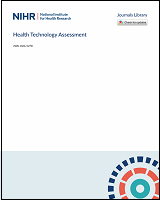NCBI Bookshelf. A service of the National Library of Medicine, National Institutes of Health.
Brazzelli M, Aucott L, Aceves-Martins M, et al. Biomarkers for assessing acute kidney injury for people who are being considered for admission to critical care: a systematic review and cost-effectiveness analysis. Southampton (UK): NIHR Journals Library; 2022 Jan. (Health Technology Assessment, No. 26.7.)

Biomarkers for assessing acute kidney injury for people who are being considered for admission to critical care: a systematic review and cost-effectiveness analysis.
Show detailsImplications for clinical practice and future research
We found that novel biomarkers have the ability to predict the presence or onset of AKI, but additional research is required to understand the incremental value of using these biomarkers on top of existing standard care. In addition, research that considers the utility of biomarkers on top of other novel approaches such as machine learning approaches to recognise incipient AKI in different clinical environments would be valuable.
There was limited trial evidence that the course of AKI in critical care circumstances may be modifiable or avoidable with early biomarker-guided care bundle approaches. Future research is needed to understand whether or not this is dependent on a well-performing timely biomarker, a care bundle appropriate for clinical context, or both. Research is also required to further evaluate such approaches outside the critical care setting.
Current literature is inadequate to determine whether or not biomarker-guided intervention can lead to hard clinical and economic outcomes, in addition to amelioration of AKI severity. The specific clinical circumstances in which benefit exists, and whether or not such benefit is dependent on reduction of AKI severity or is mediated through other means, would also be informative for future evaluations.
Uncertainty remains around the process of renal recovery and non-recovery after AKI. Mechanistic work exploring the nature, timing and extent of the recovery process could inform the nature and circumstances in which a biomarker-guided intervention might be effective. Similarly, clinical research on the timing and extent of renal recovery with different AKI phenotypes would enhance the ability to model cost-effectiveness of biomarker-guided therapies in different subsets of AKI.
In brief, we have identified the following research priorities:
- further research in the form of adequately powered, well-designed RCTs to determine the incremental value of biomarkers on clinical outcomes (such as mortality and development of CKD), quality of life, resource use, costs and cost-effectiveness
- further research to determine the clinical effectiveness and cost-effectiveness of adopting an early care bundle for the prevention/treatment of AKI, compared with standard care
- further research to help understand the quality-of-life (utility) implications for patients admitted to ICU care
- Future research to consider the potential roles for biomarker use in niche clinical areas, such as to assist in the discrimination of high- and low-risk patients who are already receiving critical care immediately after major surgery.
In addition, in the nephrology clinical research community, there is a need for efforts to standardise definitions and methods for studying AKI, kidney disease, progression, operationalisation of biomarkers and their interpretation.
- Conclusions - Biomarkers for assessing acute kidney injury for people who are be...Conclusions - Biomarkers for assessing acute kidney injury for people who are being considered for admission to critical care: a systematic review and cost-effectiveness analysis
- Preventative interventions for foot ulceration in diabetes mellitus: a systemati...Preventative interventions for foot ulceration in diabetes mellitus: a systematic review - Risk assessments and structured care interventions for prevention of foot ulceration in diabetes: development and validation of a prognostic model
- Economic evaluation: methods - A pragmatic randomised controlled trial of the ef...Economic evaluation: methods - A pragmatic randomised controlled trial of the effectiveness and cost-effectiveness of ‘PhysioDirect’ telephone assessment and advice services for physiotherapy
Your browsing activity is empty.
Activity recording is turned off.
See more...